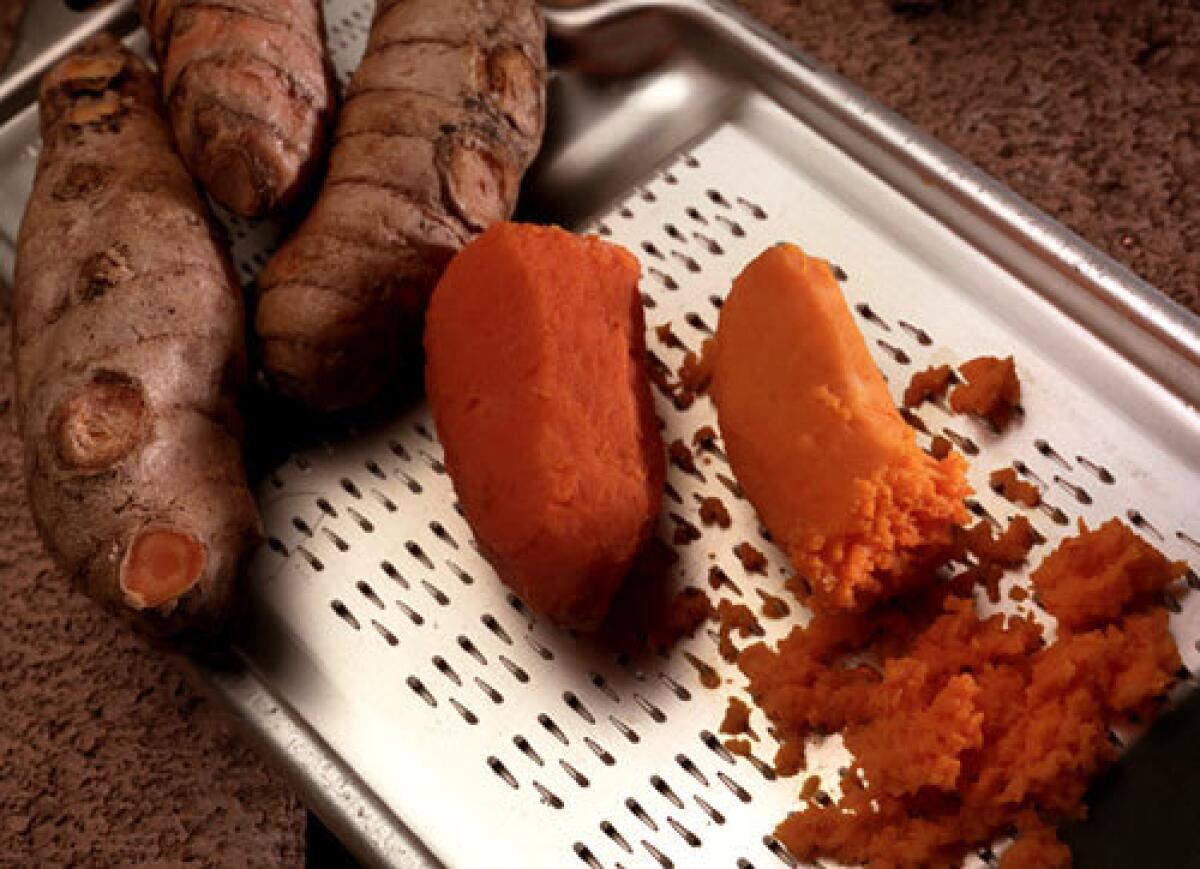Curcumin’s anti-inflammatory powers are unproven

The products: Humans have long believed in an almost magical connection between strong flavors and good health. The burn from the hot pepper? It must be energizing the body. The pungent tang of a raw oyster? It must be energizing a very particular part of the body. And the zingy sweetness of an Indian curry? For centuries, people in India have believed that the spice turmeric can ease digestive distress and arthritis.
In recent years, scientists have taken an intense interest in curcumin, a bright-yellow compound in turmeric that seems to fight inflammation -- in test tubes and lab rodents, at least. If it could fight inflammation in people too, it potentially could help ease arthritis and some digestive troubles, along with other conditions fueled by inflammation.
Curcumin’s stock in the supplement world has been on the rise thanks to articles that have touted the compound as a possible treatment for Alzheimer’s disease, multiple sclerosis and various cancers.
The stories beneath the headlines almost invariably warn that more research is needed, but the marketing of curcumin is moving full steam ahead at health-food stores, in vitamin aisles and on Internet sites. Ageless Cures sells 60 caplets of Super Curcumin -- with at least 950 milligrams of curcumin a tablet -- for about $20. You can buy 60 caplets of Life Extension’s Super Bio-Curcumin -- with a little less than 400 milligrams of curcumin a caplet -- for about $12.
The claims: The Ageless Cures website claims that “curcumin has shown to be very anti-inflammatory without any negative side effects and many additional positive benefits.” Visitors to the site are told that curcumin’s anti-inflammatory power makes it an effective treatment for arthritis, inflammatory bowel disease and Alzheimer’s disease.
In an online review of Super Bio-Curcumin, vitamin supplier Seacoast Vitamins claims that “just one capsule a day with food may help regulate inflammatory response in the body.” According to the company’s site, control of inflammation can translate into relief from rheumatoid arthritis and other types of pain.
The bottom line: If you require hard evidence for your remedies, you may want to keep your curcumin in the spice rack. For the most part, the tantalizing possibilities are still unproven, says Greg Cole, a UCLA professor-in-residence of neurology and associate director of the university’s Alzheimer Disease Center who has been studying curcumin for several years. “It does a whole lot of things in a test tube,” he says. “For people, the data are pretty weak.”
Test-tube studies have shown that curcumin can block inflammation, clean up free radicals and kill cancer cells, but there’s a big roadblock between the lab and human use. According to Cole, plain curcumin isn’t well absorbed, a shortcoming that seriously limits its potential effectiveness. (Mixing it with fat first seems to help absorption -- good news for people who like coconut milk or oil with their curries.) Cole suspects that the lack of absorption partly explains why a recent UCLA trial he conducted failed to show any benefits of curcumin for patients with Alzheimer’s disease.
For now, Cole says, curcumin shows the most promise in the digestive tract, the one place in the body that supplements are guaranteed to reach. Preliminary trials of patients with colon cancer have found that taking up to 3.6 grams of curcumin a day appears to slow down the disease. A 2005 study of 10 people with inflammatory bowel disease -- either Crohn’s disease or ulcerative colitis -- found that 1.1 to 1.7 grams of curcumin a day for two months relieved symptoms and reduced the need for medications. The small study was not placebo controlled, however, which leaves room for doubt.
Bharat Aggarwal, professor of cancer research at the University of Texas’ M.D. Anderson Cancer Center in Houston and a leading curcumin researcher, says that big, expensive human trials of the compound haven’t been done because drug companies can’t make money selling a curry spice. Despite this, at least a dozen small clinical trials are underway around the world. He believes that the compound shows great potential for treating Alzheimer’s, inflammatory bowel disease, arthritis, cardiovascular disease and other conditions caused by inflammation. Anecdotally, he says, “I have a thousand patients who correspond with me, and the response [to curcumin] has been overwhelming.”
Cole says some of his patients have also reported dramatic improvements after trying curcumin. “Is there any truth to it? I don’t know.”
Based on evidence so far, curcumin might be worth a try for people hoping to avoid colon cancer, including those at high risk because of polyps, says Dr. Mary Hardy, medical director of the Simms/Mann-UCLA Center for Integrative Oncology. The benefits for other types of cancers are much less certain, she says. Still, “I don’t expect it to be harmful, so if someone was excited about taking it, I wouldn’t tell them not to.”
Cole agrees that there’s little downside to trying curcumin. Because the compound is so poorly absorbed, he sees little potential for harm. Studies have found that people can take 7 grams a day without side effects, although it’s possible that larger doses, or use over longer periods of time, can upset the stomach and perhaps increase the risk of bleeding.
Is there a consumer product you’d like the Healthy Skeptic to examine? E-mail the details to [email protected].




